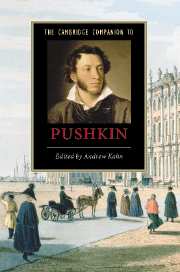Book contents
- Frontmatter
- Introduction
- Part I Texts and Contexts
- 1 Pushkin’s life
- 2 Pushkin’s lyric identities
- 3 Evgenii Onegin
- 4 Pushkin’s drama
- 5 Pushkin’s long poems and the epic impulse
- 6 Prose fiction
- 7 Pushkin and politics
- 8 Pushkin and history
- 9 Pushkin and the art of the letter
- 10 Pushkin and literary criticism
- Part II The Pushkinian tradition
- Appendix on verse-forms
- Guide to further reading
- Index
10 - Pushkin and literary criticism
from Part I - Texts and Contexts
Published online by Cambridge University Press: 28 March 2007
- Frontmatter
- Introduction
- Part I Texts and Contexts
- 1 Pushkin’s life
- 2 Pushkin’s lyric identities
- 3 Evgenii Onegin
- 4 Pushkin’s drama
- 5 Pushkin’s long poems and the epic impulse
- 6 Prose fiction
- 7 Pushkin and politics
- 8 Pushkin and history
- 9 Pushkin and the art of the letter
- 10 Pushkin and literary criticism
- Part II The Pushkinian tradition
- Appendix on verse-forms
- Guide to further reading
- Index
Summary
Context
In his twenty-three years of public literary life, which included active participation in two periodicals, The Literary Gazette (1830-31) and The Contemporary (1836-37), Alexander Pushkin published only fifty-two prose pieces on literary subjects, many of them just a paragraph in length. Serious scholarly editions of his work include nine unfinished articles intended for The Contemporary and over sixty critical fragments from his notebooks. Yet Pushkin was nothing if not critical. From his first published work, 'To a Poet-Friend' (1814), to the last lines he penned before his fatal duel (27 January 1837), a letter of encouragement to the writer Alexandra Ishimova, Pushkin indefatigably engaged in the analysis and judgement of literary works and literary life. In ways both bold and subtle, his verse and prose works, regardless of genre, obsessively reflect upon literary instances, fads and traditions. Nikolai Gogol’s haunting characterisation of Pushkin’s work, 'in every word there is an abyss of space', may be partly understood in terms of the explicitly and implicitly critical quality of Pushkin’s writing. None of his works illustrates this more comprehensively than Evgenii Onegin, in which the author-narrator’s unfolding encounters with critics, with literary fashions, with genres and with the expectations of his readers make the verse novel nothing less than a critical autobiography.
- Type
- Chapter
- Information
- The Cambridge Companion to Pushkin , pp. 143 - 156Publisher: Cambridge University PressPrint publication year: 2006

